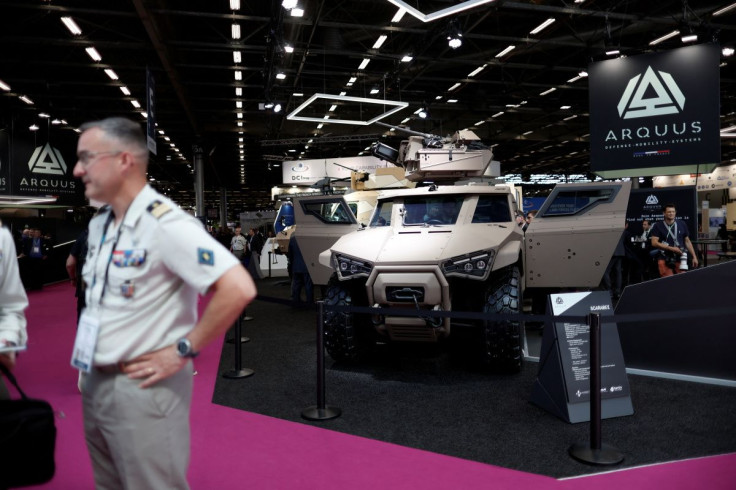'War Is Good For Business' As Drive To Arm Ukraine Looms Over French Expo

Next to Ukraine's stand at the world's largest arms fair for ground forces on Monday, U.S. manufacturer Lockheed Martin proudly displays its anti-tank Javelin missile like a big brother protecting its younger sibling.
The weapon has been key to Kyiv's defence against Moscow's invasion, and as France hosted the annual Eurosatory arms bazaar, the symbolism was not lost on some of the thousands of people who make, buy and use advanced weapons.
"This year is all about Ukraine. War is good for business, but it's not something I am happy about," one eastern European manufacturer said speaking on condition of anonymity.
Returning after a COVID-19 pandemic hiatus, the exhibition bristles with weaponry from about 60 countries, including tanks, armoured vehicles, riot gear and display cases crammed with guns and ammunition.
This year, the world's second largest arms exporter is absent: three Russian manufacturers were set to come but pulled out. Meanwhile, among the 1,700 exhibitors, the numbers of stands from some Baltic and eastern European countries have doubled or tripled.
Many in attendance spoke of a massive surge in demand as countries ramp up production, both to send munitions to Ukraine and to beef up their own arsenals.
"France has entered a war economy," President Emmanuel Macron said at the opening of the arms show, calling for European powers to learn from their past mistakes and develop the defence industry amongst themselves.
"We have to go much further, much more quickly and more strongly because geopolitics dictates."
Several manufacturers told Reuters there was a shortage of capacity, notably in Europe, which has for years depended on imported - especially American - arms. Some providers said they would not be able to catch up to the demand to arm Ukraine until 2024-2025.
Elie Tenenbaum, Director of the Security Studies Centre at the Paris-based Institute of International relations, said Ukraine's armed forces were now using more ammunition in a day than Europe's arms industry could produce in a month.
"We now have a European defence industry which is unfit for the warfare we see in Ukraine," he said.
A lack of production capacity both for Ukraine and Russia could eventually slow the pace of the conflict, he added.
Highlighting that urgency, Le Monde newspaper reported on Monday that French authorities were considering legislation to requisition civilian factories to increase the capacity to make weapons.
© Copyright Thomson Reuters 2024. All rights reserved.







